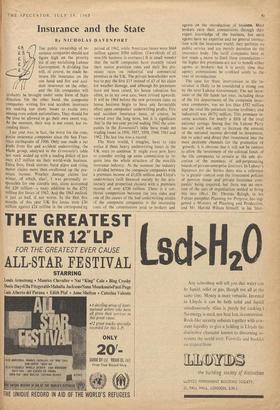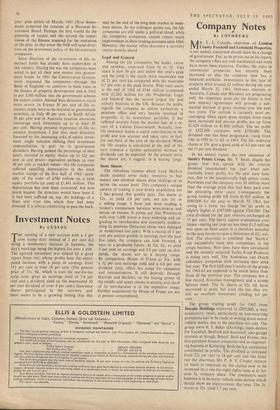Insurance and the State
By NICHOLAS DAVENPORT
THE public ownership of in- Last year was, in fact, the worst for the corn, posite insurance companies since the San Fran- cisco earthquake of .1906. Only one made a net Profit from fire and accident underwriting; the Whole group, analysed in the Economist's table last week ended up with a trading deficit of just Over £12 million on their world-wide business. Extra fires, freak storms, burst pipes and rising motor claims more than *swallowed up the pre- mium income. Weather damage claims last winter, of which, alas!, I was personally re- sponsible for one sizeable loss, alone accounted for £20 million—a nasty addition to the £554 million fire losses of 1962. And the 1963 outlook is just as bad, if not worse. In the first five months of this year UK fire losses were £30 million against £24 million in the correspond'ng period of 1962, while American losses were $668 million against $584 million. (Two-thirds of all non-life business is overseas.) It is small wonder that the tariff companies have recently raised their motor premium rates and their fire pre- mium rates on industrial and commercial premises in the UK. The private householder now has to pay the first £15 instead of £5 of his claim for weather damage, and although his premiums have not been raised, his house valuation has often, as in my own case, been revised upwards. It will be 1964 before the new premium rates on house business begin to have any favourable effect upon companies' underwriting profits. Fire and accident insurance must, of course, be view ed over the long term, but it is significant that in the ten-year period ending 1962 the corn- panics in the Economist's table have made net trading losses in 1956, 1957, 1958, 1960, 1961 and 1962. The last loss was a record.
The State would, I imagine, have to take notice if these heavy underwriting losses in the UK were to continue. It might even now have to consider setting up sonic commission to in- quire into the whole structure of the non-life insurance industry. At the moment the industry is divided between the composite companies with a premium income of £1,026 million and Lloyd's underwriters (still financed mainly by the aris- tocracy and propertied classes) with a premium income of over £320 million. There is a cut- throat competition between the two sides and one of the causes of the bad underwriting results of the composite companies is the increasing costs of the commissions paid to brokers and
agents on the introduction of business. Most brokers earn their commissions through their expert knowledge of the business, but most agents have no expertise and no general connec- tion with the insurance world; they perform no public service and are merely parasites on the insurance body. The tariff companies have at last made a move to limit these commissions— the higher fire premiums are not to benefit either agents or brokers—but it is surely time that agency commissions he confined solely to the year of introduction.
The case for State intervention in life in- surance is likely to be considered a strong one by the next Labour Government. The net 'incre- ment of the life funds last year, including those of the life departments of the composite insur- ance companies, was no less than £537 million and the total life premium income (ordinary and industrial) was £8751 million. This premium in- come accounts for nearly a fifth of the total national savings. Seeing that the Labour Party has set itself not only to increase the amount of the national income devoted to investment, but to select and direct that investment into the most desirable channels for the promotion of 'growth,' it is obvious that it will not be content to allow the investment of the colossal funds of the life companies to remain at the sole dis- cretion of the members of self-perpetuating boards of private-enterprise directors. In Labour's Signposts for the Sixties there was a reference to 'a greater control over the investment policies of pension funds and private insurance com- panies' being required, but there was no men- tion of the sort of organisation needed to bring this into effect. Dr. Thomas Balogh, in his Fabian pamphlet Planning for Progress, has sug- gested a Ministry of Planning and Production, and Mr. Harold Wilson himself, in his 'four- year' plan article of March, 1961 (New States- man), proposed the creation of a National In- vestment Board. Perhaps the first would do the planning of output and the second the super- vision of the finance required for the execution of the plan. In that event the NIB will issue direc- tives on the investment policy of the life insurance companies.
Some direction of the investment of life In- surance funds has already been undertaken in this country. During the war the companies, were asked to put all their new money into govern- ment bonds. In 1961 the Conservative Govern- ment requested the companies—through the Bank of England—to conform to bank rules in the finance of property development and in 1962 to put £100 million into the government scheme for export credits. Abroad State direction is much more severe. In France 50 per cent of life in- surance funds have to be invested in government securities, in Italy 40 per cent, in South Africa 30 per cent and in Australia taxation incentives encourage such investment up to at least 30 per cent. Having personal experience of life in- surance investment, I feel that most directors, harassed by the increasing risks of equity invest- ment, might welcome shifting their investment responsibilities in part on to government shoulders. Having pushed the percentage of their assets invested in equity shares up to 22} per cent at cost prices—equivalent perhaps to over 40 per cent at market values—the life companies suffered appalling depreciation in the stock market slumps of the first half of 1962—prob- ably of the order of £500 million on a total equity portfolio (at cost) of £1,441 million. This depreciation has now been recovered, but how Much happier the directors would have been if it had been suffered on, say, the holdings of .a State unit trust into which they had been directed. It is always comforting to pass the buck.































 Previous page
Previous page